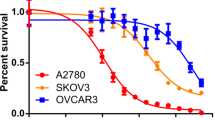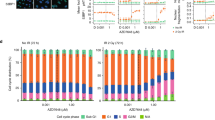Abstract
UCN-01 is undergoing Phase I evaluation and is a candidate forcombination strategies in the clinic. UCN-01 has been shown to havea variety of effects on cellular targets and the cell cycle. It hasalso been reported to sensitize cells to several clinical drugsin vitro, possibly in a manner related to p53 status. Thus,combinations of UCN-01 with a series of clinical agents in varietyof cell lines have been investigated in vitro. Certain celllines demonstrated synergistic interactions with combinations ofUCN-01 (20–150 nM) and thiotepa, mitomycin C, cisplatin, melphalan,topotecan, gemcitabine, fludarabine or 5-fluorouracil. In contrast,UCN-01 combinations with the antimitotic agents, paclitaxel andvincristine, or topoisomerase II inhibitors, adriamycin andetoposide, did not result in synergy, only in additive toxicity.Cells with non-functional p53 were significantly more susceptibleto the supra-additive effects of certain DNA-damaging agents andUCN-01 combinations, than cells expressing functional p53 activity.In contrast, there was no significant relationship between p53status and susceptibility to synergy between antimetabolites andUCN-01. The mechanism behind the observed synergy appearedunrelated to effects on protein kinase C or abrogation of the cellcycle in G2. Moreover, increased apoptosis did not fully explainthe supradditive response. These data indicate that UCN-01sensitizes a variety of cell lines to certain DNA-damaging agents(frequently covalent DNA-binding drugs) and antimetabolites invitro, but the mechanism underlying this interaction remainsundefined.
Similar content being viewed by others
References
Akinaga S, Gomi K, Morimoto M, Tamaoki T, Okabe M: Antitumor activity of UCN-01, a selective inhibitor of protein kinase C, in murine and human tumor models. Cancer Res 51: 4888–4892, 1991
Takahashi I, Kobayashi E, Asano K, Yoshida M, Nakano H: UCN-01, a selective inhibitor of protein kinase C from Streptomyces. J Antibot (Tokyo) 40: 1782–1784, 1987
Takahashi I, Saitoh Y, Yoshida M, Sano H, Nakano H, Morimoto M, Tamaoki T: UCN-01 and UCN-02, new selective inhibitors of protein kinase C. II. Purification, physico-chemical properties, structural determination and biological activities. J Antibiot (Tokyo) 42: 571–576, 1989
Wang Q, Worland PJ, Clark JL, Carlson BA, Sausville EA: Apoptosis in 7-hydroxystaurosporine-treated T lymphoblasts correlates with activation of cyclin-dependent kinases 1 and 2. Cell Growth Differ 6: 927–936, 1995
Courage C, Budworth J, Gescher A: Comparison of ability of protein kinase C inhibitors to arrest cell growth and to alter cellular protein kinase C localisation. Br J Cancer 71: 697–704, 1995
Seynaeve CM, Stetler-Stevenson M, Sebers S, Kaur G, Sausville EA, Worland PJ: Cell cycle arrest and growth inhibition by the protein kinase antagonist UCN-01 in human breast carcinoma cells. Cancer Res 53: 2081–2086, 1993
Courage C, Snowden R, Gescher A: Differential effects of staurosporine analogues on cell cycle, growth and viability in A549 cells. Br J Cancer 74: 1199–1205, 1996
Akiyama T, Yoshida T, Tsujita T, Shimizu M, Mizukami T, Okabe M, Akinaga S: G1 phase accumulation induced by UCN-01 is associated with dephosphorylation of Rb and CDK2 proteins as well as induction of CDK inhibitor p21/Cip1/WAF1/Sdi1 in p53-mutated human epidermoid carcinoma A431 cells. Cancer Res 57: 1495–1501, 1997
Wang Q, Worland PJ, Clark JL, Carlson BA, Sausville EA: Apoptosis in 7-hydroxystaurosporine-treated T lymphoblasts correlates with activation of cyclin-dependent kinases 1 and 2. Cell Growth Differ 6: 927–936, 1995
Kawakami K, Futami H, Takahara J, Yamaguchi K: UCN-01, 7-hydroxyl-staurosporine, inhibits kinase activity of cyclin-dependent kinasas and reduces the phosphorylation of the retinoblastoma susceptibility gene product in A549 human lung cancer cell line. Biochem Biophys Res Commun 219: 778–783, 1996
Shimizu E, Zhao MR, Nakanishi H, Yamamoto A, Yoshida S, Takada M, Ogura T, Sone S: Differing effects of staurosporine and UCN-01 on RB protein phosphorylation and expression of lung cancer cell lines. Oncology 53: 494–504, 1996
Wang Q, Fan S, Eastman A, Worland PJ, Sausville EA, O'Connor PM: UCN-01: a potent abrogator of G2 checkpoint function in cancer cells with disrupted p53. J Natl Cancer Inst 88: 956–965, 1996
Bunch RT, Eastman A: Enhancement of cisplatin-induced cytotoxicity by 7-hydroxystaurosporine (UCN-01), a new G2-checkpoint inhibitor. Clin Cancer Res 2: 791–797, 1996
Shao RG, Cao CX, Shimizu T, O'Connor PM, Kohn KW, Pommier Y: Abrogation of an S-phase checkpoint and potentiation of camptothecin cytotoxicity by 7-hydroxystaurosporine (UCN-01) in human cancer cell lines, possibly influenced by p53 function. Cancer Res 57: 4029–4035, 1997
Bunch RT, Eastman A: 7-hydroxystaurosporine (UCN-01) causes redistribution of proliferating cell nuclear antigen and abrogates cisplatin-induced S-phase arrest in Chinese hamster ovary cells. Cell Growth Differ 8: 779–788, 1997
Akinaga S, Nomura K, Gomi K, Okabe M: Enhancement of antitumor activity of mitomycin C in vitro and in vivo by UCN-01, a selective inhibitor of protein kinase C. Cancer Chemother Pharmacol 32: 183–189, 1993
Pollack IF, Kawecki S, Lazo JS: Blocking of glioma proliferation in vitro and in vivo and potentiating the effects of BCNU and cisplatin: UCN-01, a selective protein kinase C inhibitor. J Neurosurg 84: 1024–1032, 1996
Husain A, Yan XJ, Rosales N, Aghajanian C, Schwartz GK, Spriggs DR: UCN-01 in ovary cancer cells: effective as a single agent and in combination with cis-diamminedichloroplatinum (II) independent of p53 status. Clin Cancer Res 3: 2089–2097, 1997
Tsuchida E, Urano M: The effect of UCN-01 (7-hydroxystaurosporine), a potent inhibitor of protein kinase C, on fractionated radiotherapy or daily chemotherapy of a murine fibrosarcoma. Int J Radiat Oncol Biol Phys 39: 1153–1161, 1997
Hsueh CT, Kelsen D, Schwartz GK: UCN-01 suppresses thymidylate synthase gene expression and enhances 5-fluorouracil-induced apoptosis in a sequence-dependent manner. Clin Cancer Res 4: 2201–2206, 1998
Bauer DJ: The antiviral and synergic actions of isatin thiosemicarbazone and certain phenoxypyrimidines in vaccinia infection in mice. Br J Exp Pathology 36: 105–109, 1954
Prichard MN, Shipman C Jr: A three-dimensional model to analyze drug-drug interactions. Antiviral Res 14: 181–205, 1990
Monks A, Scudiero D, Skehan P, Shoemaker R, Paull K, Vistica D, Hose C, Langley J, Cronice P, Vaigro-Wolff A: Feasibility of a high-flux anticancer drug screen using a diverse panel of cultured human tumor cells lines. J Natl Cancer Inst 83: 757–766, 1997
Skehan P, Storeng R, Scudiero D, Monks A, McMahon J, Vistica D, Warren JT, Bokesch H, Kenney S, Boyd MR: New colorimetric cytotoxicity assay for anticancer-drug screening. J Natl Cancer Inst 82: 1107–1112, 1990
Dale IL, Bradshaw TD, Gescher A, Pettit GR: Comparison of effects of bryostatins 1 and 2 and 12-O-tetradecanoylphorbol-13-acetate on protein kinase C activity in A549 human lung carcinoma cells. Cancer Res 49: 3242–3245, 1989
O'Connor PM, Ferris DK, Hoffmann I, Jackman J, Draetta G, Kohn KW: Role of the cdc25C phosphatase in G2 arrest induced by nitrogen mustard. Proc Natl Acad Sci 91: 9480–9484, 1994
O'Connor PM: Mammalian G1 and G2 phase checkpoints. Cancer Surv 29: 151–182, 1997
Yu L, Orlandi L, Wang P, Orr MS, Senderowicz AM, Sausville EA, Silverstrini R, Watanabe N, Piwnica-Worms H, O'Connor PM: UCN-01 abrogates G2 arrest through a Cdc2-dependent pathway that is associated with inactivation of the Wee1Hu kinase and activation of the Cdc25C phosphatase. J Biol Chem 273: 33455–33464, 1998
Fuse E, Tanii H, Kurata N, Kobayashi H, Shimada Y, Tamura T, Sasaki Y, Tanigawara Y, Lush RD, Headlee D, Figg WD, Arbuck SG, Senderowicz AM, Sausville EA, Akinaga S, Kuwabara T, Kobayashi S: Unpredicted clinical pharmacology of UCN-01 caused by specific binding to human alpha1-acid glycoprotein. Cancer Res 58: 3248–3253, 1998
Senderowicz AM, Headlee D, Luch R, Sausville EA: Phase I trial of infusional UCN-01, a novel protein kinase inhibitor, in patients with refractory neoplasms. In Proc thirty-fifth Annual Meeting of the American Society of Clinical Oncology: G12, 1999
Author information
Authors and Affiliations
Rights and permissions
About this article
Cite this article
Monks, A., Harris, E.D., Vaigro-Wolff, A. et al. UCN-01 Enhances the In Vitro Toxicity of Clinical Agents in Human Tumor Cell Lines. Invest New Drugs 18, 95–107 (2000). https://doi.org/10.1023/A:1006313611677
Issue Date:
DOI: https://doi.org/10.1023/A:1006313611677




